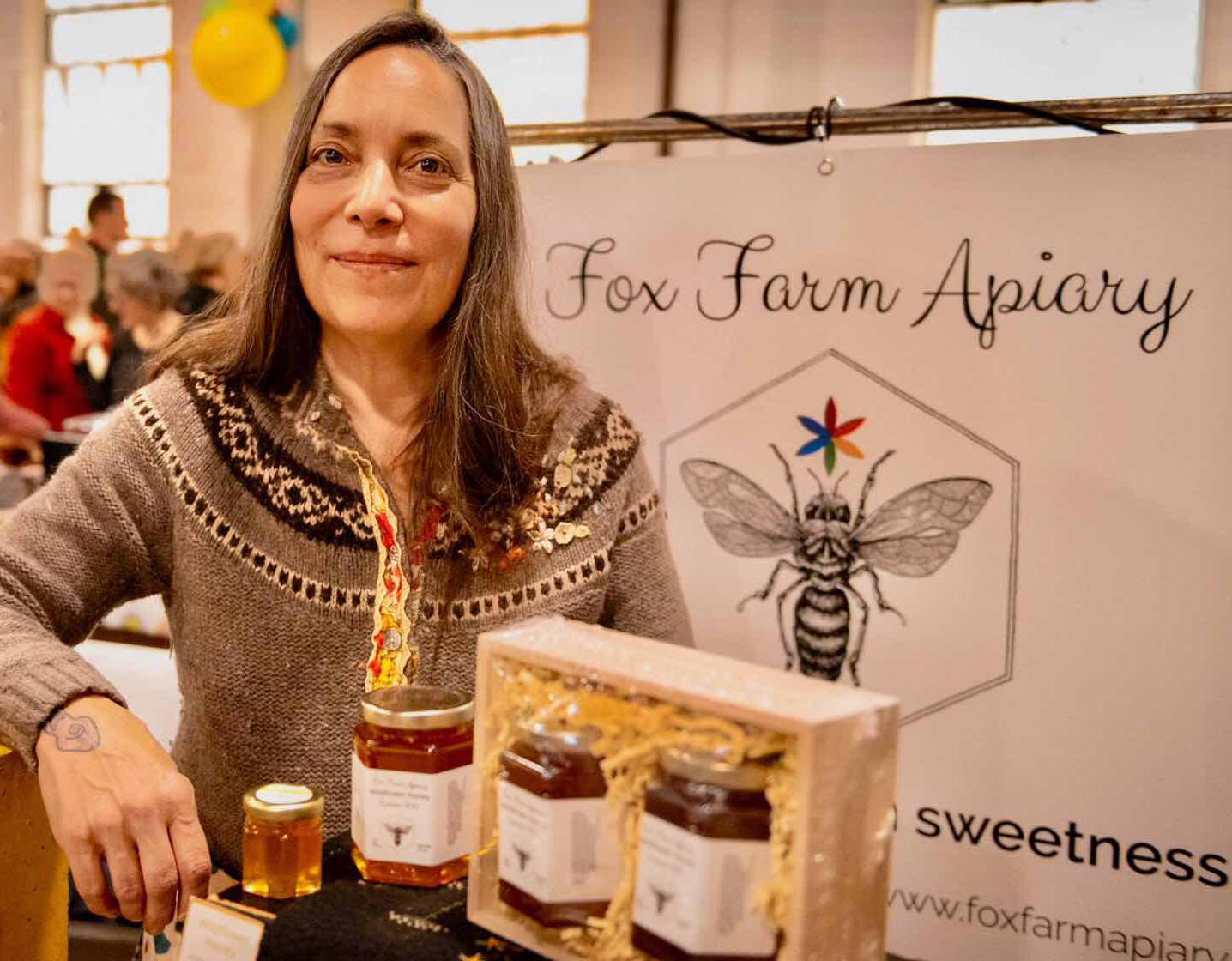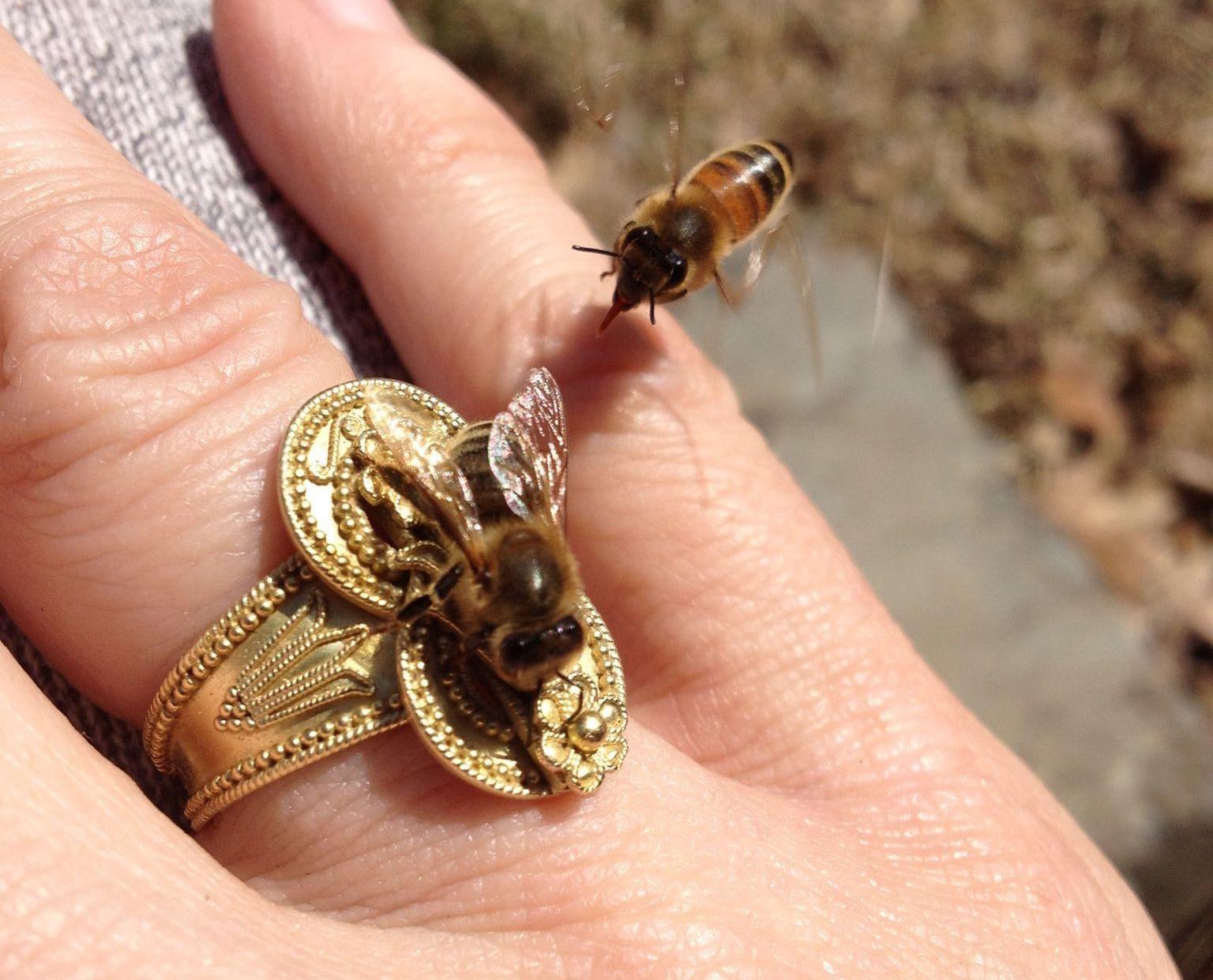
Article and photos by Lisa Marie Layman
“Actually, every human being should show the greatest interest in beekeeping because, much more than you can imagine, our lives depend on it.” – Rudolf Steiner
Honey bees are our most important pollinators. From apples and broccoli to the almonds in the almond milk behind every barista counter, honey bee pollination is directly responsible for 70% of the foods we rely on.
But today there’s a crisis facing the bees and other pollinators. Before industrial farming became mainstream, you used to be able to put a few hives out in the spring and leave them alone until late summer’s honey harvest.
This is no longer the case. Threats to honey bee health stem from a perfect storm of harmful factors: loss of habitat, reduced nutrition, and new diseases spread by new predators.
For honey bee hives to stay healthy today, they require the expert attention of caring beekeepers.
Lisa and Chris Layman are two such beekeepers, committed to caring for and educating about healthy honey bee hives.
Lisa and Chris established upstate New York’s Fox Farm Apiary in 2011 for two primary reasons:
- First, an understanding of the need for healthy bee populations.
- And second, a desire to bring health and healing to the honey bees, their family, and their community.
Today, Lisa collects beeswax, honey, pollen, and propolis for use in her award-winning line of wellness and body care products.
Chris ensures the hives stay healthy. He also teaches about honey bee health and pollinator planting locally and virtually.
While honey bees have seen a rise in awareness for their significance to our ecosystems and the modern threats they face, beekeeping itself still remains a mystery to many.
Below, Lisa’s pulling back the curtain on some of the common beekeeping questions she and Chris receive.
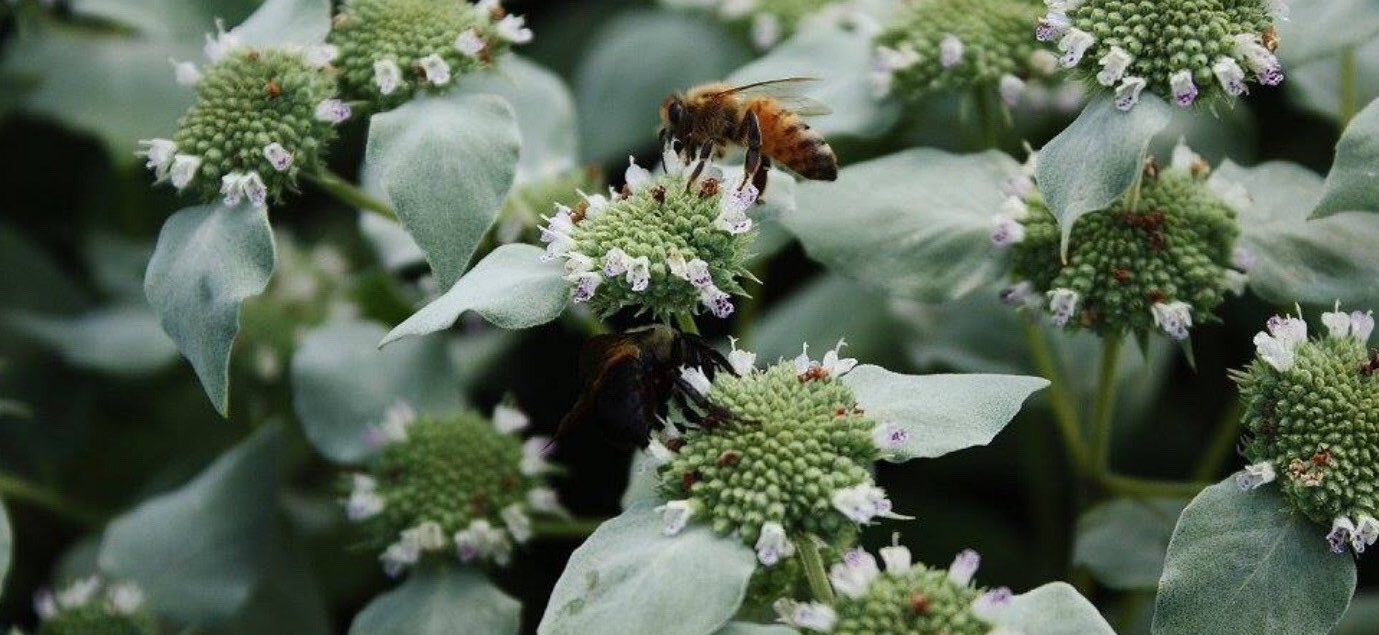
How many bees do you have?
During the summer, each of our hives houses up to 80,000 bees. All the bees in the hive work together as one super-organism.
How long do they live?
The queen bee has the longest lifespan (1-3 years).
Male drones live for just one summer.
The female worker bees comprise the majority of the population, but only live for about 4 weeks. Their first task after they’re born is to clean out their cell. This prepares it for the queen to lay another egg.
The worker bees spend the first two weeks of their short lives inside the hive acting as nurse bees, caring for their emerging sisters.
They live out the remainder of their time as foragers. Those are the bees you see on blossoms.
Remarkably, worker bees born toward the end of the season will live through the winter to help reestablish normal hive activity in the spring.
Do your bees have a favorite flower?
Believe it or not, the lowly dandelion is one of the most important flowers for the honey bees. It’s a source of nearly complete honey bee nutrition.
We make sure that the plants around our apiaries will provide vital nutrients for the honey bees. These are plants like lupine, calendula, anise hyssop, comfrey, bee balm, mountain mint and sunflower.
In addition to the plants in our gardens, the bees enjoy plants that grow wild here in the pesticide-free meadows of upstate New York: roses, elderflowers, St John’s Wort, yarrow and goldenrod.
I use many of these plants in my wellness and body care products. It’s important to my approach that the plants used in my products have been graced by our honey bees. It’s a holistic representation of the unbroken connection between plant health, bee health, and human health.
Are they attacked by natural predators? What are their predators?
Predators range in size from the largest bear to the tiniest mite.
Bears will come looking for a protein-rich meal of baby bees with honey for dessert. To protect against them, each of our apiaries is enclosed by a solar electric fence.
Varroa mites, a relatively new predator, can infect the hives with devastating diseases. We inspect our hives regularly and treat for mites without synthetic chemicals.
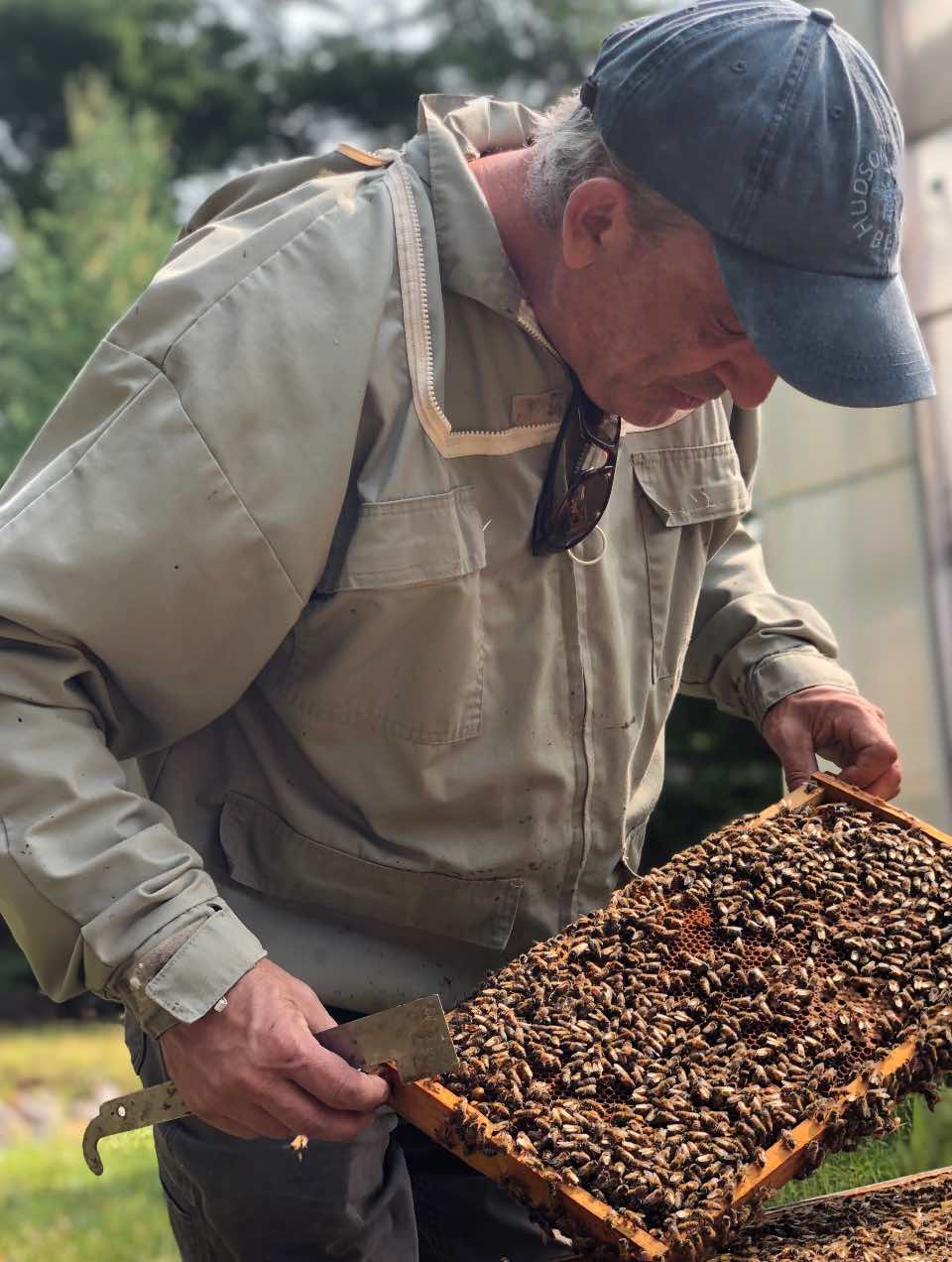
“We have chosen to fill our hives with honey and wax; thus furnishing mankind with the two noblest of things, which are sweetness and light.”
— Jonathan Swift (1667-1745)
What do you do with the honey?
While some beekeepers focus on honey production, we take only surplus honey. Some of the honey is sold to local stores. Some is brewed for use in our Honey Beer
Solid Shampoo Bars. The rest is incorporated into our soaps, scrubs, and lotions.
We ensure that our honey is raw and only lightly filtered to preserve naturally-occuring beneficial enzymes and healing properties.
How often do you get stung?
It’s highly unusual––perhaps 3–5 times a year.
If I’m just visiting with the bees, they’re unbothered by my presence and won’t sting me.
But if I plan to open up the hive, it’s more likely they would feel threatened and potentially sting. On these occasions, I suit up with a loose jacket, a veil, and gloves, just in case.
Honey bees don’t necessarily want to sting. If they feel they must, it’s the ultimate sacrifice for the hive: they’ll die immediately afterward.
Is there anything we can do to help the bee colonies in our own gardens?
Planting gardens with bees and other pollinators in mind will help provide much-needed nectar and pollen.
Avoid using chemical sprays like RoundUp. Herbicides can poison food sources and harm the bees.
If you’re interested in learning more, we have a page on our website that goes into greater detail about how people can support honey bees.
But the easiest way to help?
Send love to the honey bees. They perceive vibrational energies all around them.
A Little Bit About Chris and Lisa
We are Chris and Lisa Layman, Beekeepers for the past eleven seasons at Fox Farm Apiary. We came to beekeeping and to each other through a shared drive to protect and support these most essential pollinators.
Currently we maintain several apiaries, with one on our farm in New York’s Greene County, near the Alcove Reservoir from which the city of Albany draws its water, and others on properties throughout five counties in the Hudson Valley. In addition, we are proud to be beekeepers at Olana, Opus 40, Greene Land Trust and Woodstock Land Conservancy
Chris is an independent researcher devoted to deeply understanding and supporting the life of the hive. He will receive his Master Beekeeper’s certification from Cornell University in June 2021. Chris maintains a Pollinator Garden at Thorn Preserve in Woodstock, NY and shares his knowledge and expertise by mentoring, consulting and leading educational Pollinator Walks
Lisa is a certified aromatherapist who trained with Taoist Master Dr. Jeffrey Yuen in Aromatherapy from a Chinese Medical Perspective. She creates award-winning natural skincare, herbal remedies, soaps and candles that incorporate the honey, beeswax, pollen, propolis and botanicals produced by Fox Farm bees. You can find her products online at foxfarmapiary.com.
Photo of Lisa (top left) Veronica Fass Photography
Fox Farm Apiary
“At Fox Farm Apiaries, we care deeply about honeybees and our shared future on this planet.”
Please follow Fox Farm Apiary at
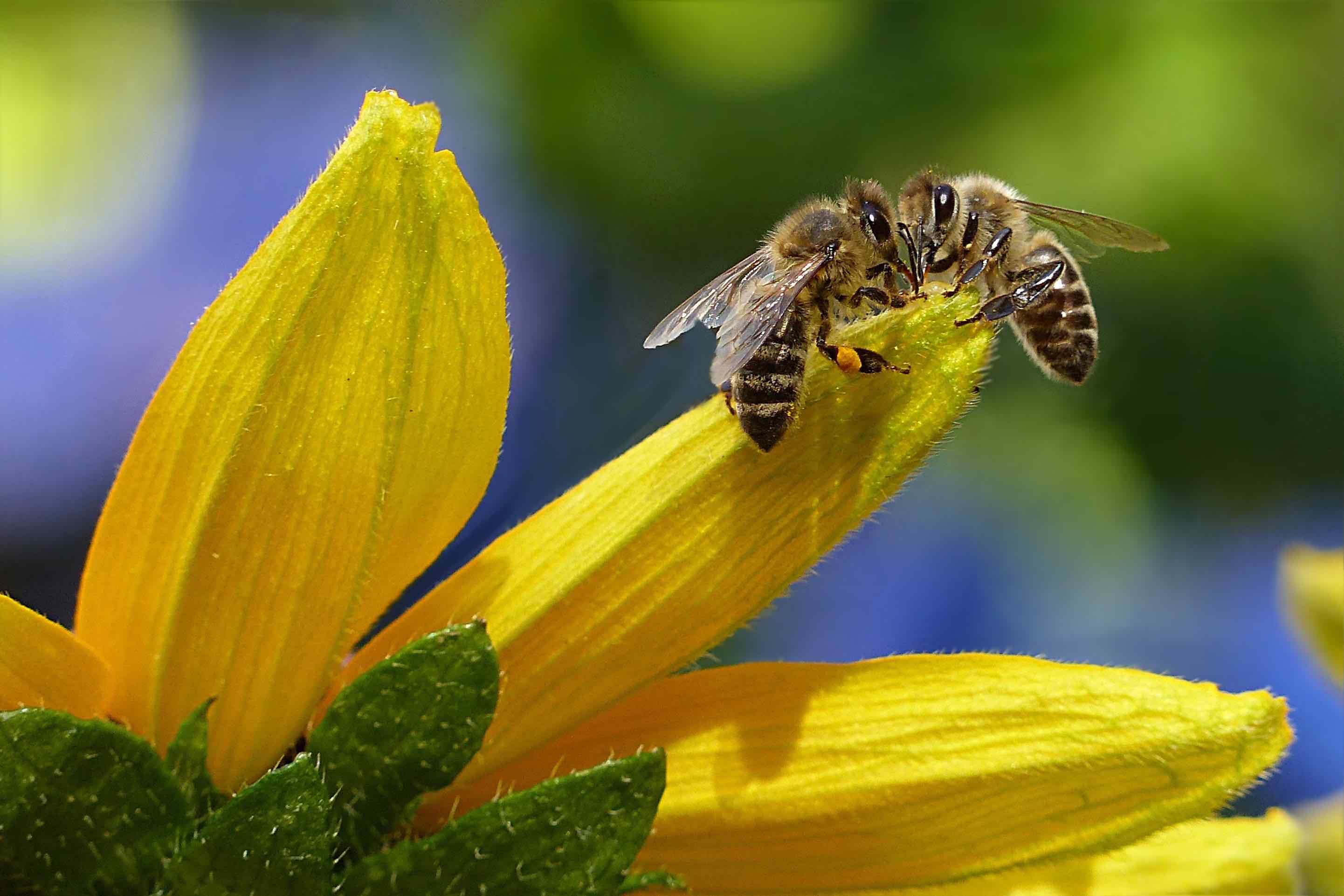
RELATED STORY
Connect With Us on Social Media!
RECENT FAVES
Tips for Hitting the Road with Your Furry Friends
Part 1 of Kathlene McGovern’s 2 part series on the best and safest ways to travel with your furry friends!
I’m Just Curious
Dove Rose give us ideas on how to stay curious! Keep it Fresh in the Kitchen, on the Drive and in your Life. New ideas to keep our mind alive!
Living Unhoused for a Week: Ken Craft Takes to the Streets
Ken Craft of Hope of the Valley lives unhoused on the streets of the San Fernando Valley for 100 hours and shares the challenges, insights and struggles he faced on this journey.

